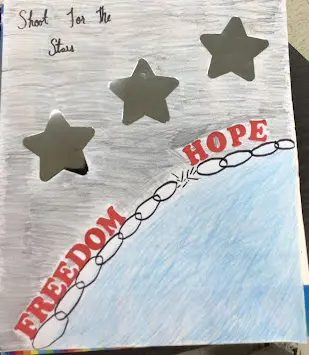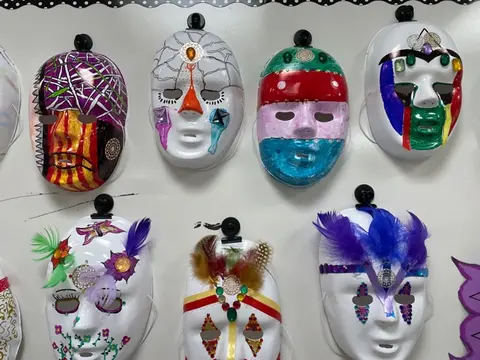This approach to teaching The 1619 Project: Born on the Water was developed by Julie Emra and Noncy Fields, 5th grade teachers in Ann Arbor, MI as a part of the Pulitzer Center-Penguin Random House 1619 Project book pilot program. It is the framework used in their developing unit on Born on the Water titled "Uncovering and Reclaiming Historical Identities."
Using Born on The Water to explore stories and stereotypes
Emra and Fields' unit aims to introduce conversations about the power of storytelling in reinforcing and combating stereotypes. The project invites students to interrogate their prior knowledge about the African continent and any stereotypes they hold while also allowing students to reflect on their own identities and histories.
"After reading through our students’ pre-assessments, particularly the questions that asked, ‘What do you know about Africa?’ and ‘List all the words that come to mind when you think about Africa,’ we learned that students had very limited background knowledge about Africa. On their assessments, they shared words like lions, tigers, animals, starvation, no electricity, desert, poor. These stereotypes that the majority of our classes wrote down allowed us to think about the various stereotypes that we would address throughout the topic."
In a joint statement, Emra and Fields explain that the project will “guide students to a unit project where they research their own historical identities similarly to the way that the character does in the text with identifying the flag that represents her.” They offer the following guiding questions and pacing for sharing the text:
| Topic Question | Born on the Water |
| Topic 1: Why study Africa? How do you uncover a historical identity? | Read the text through the Africa section |
| Topic 2: What has disrupted the historical identities of Black people in the U.S.? | Read the text through the Middle Passage section - “We were born on the water. / We come from the people who refused to die.” |
| Topic 3: How does knowledge of resistance cultivate a historical identity? | Read the text through the “Resist” section |
| Topic 4: How can we reclaim and uncover our own historical identities? | Read entire text |
“In reading Born on the Water, students were particularly drawn to the illustrations. They studied them closely and wanted each teacher to spend a lot of time on each page as they looked at the illustrations. In Ms. Emra’s class, students spent a lot of time on the page where there is an outline of the continent of Africa and it looks like a hand is holding the continent in the water.On the other hand, Mrs. Fields’ class chose to focus on the page where people were dancing and joyful. Both of us noted that these images of joy highlighted a much more empowering image of African people than students indicated on their survey, and that these images present a joyful rendition of Africa that helps students challenge their current thinking.”
This activity was developed by Carrie Jackson, an 11th-12th grade AP U.S. history teacher in New York, NY as a part of the Pulitzer Center-Penguin Random House 1619 Project book pilot program.
Born on the Water: A Flipped Classroom Approach
Jackson’s students used their reading and analysis skills to design their own original lesson plans for the Born on the Water text. In this way, students were given an opportunity to uniquely understand the text as an instructional resource as they created learning goals and objectives for their peers.
Students started by reading, discussing, and analyzing content and events from Born on the Water. They participated in debriefing and sharing using Google Classroom, and then collaborated in groups to design original lesson plans that model ways to engage with the content and themes from the book.
“I decided to take this approach to creating this lesson plan because I wanted my students to think about how to reach and/or teach others about the importance of this book and historical content related to it”
Carrie Jackson
One student-written lesson plan described the steps for devising short stories modeled on Born on the Water that reflect the perspectives of Africans before enslavement and while being forcibly transported to the Americas during the Middle Passage. Another lesson guided students in creating DIY dolls that represent their own stories and reflect their identities, memories, and more.

This activity was developed by Christine Fryer, a social studies teacher in New York, NY as a part of the Pulitzer Center-Penguin Random House 1619 Project book pilot program. The activity is part of a larger unit Fryer is implementing that utilizes the essay “Sugar” by Khalil Gibran Muhammad for The 1619 Project as a central text. A New Origin Story includes an expanded version of the essay, but the original essay text can be found here.
Born on the Water: Exploring Culture and Identity with Art
Fryer integrated Born on the Water into her Global History III classes while talking to students about the West African Kingdoms and the beginnings of trans-Atlantic enslavement. Following their engagement with Born on the Water, students embarked on a mask-making project with the support of their art teacher, Erica Yonks. The project asked students to design masks that represent them personally and/or culturally. Students were tasked with creating a mask that represented them personally/culturally. Students had to use at least three colors and two symbols.
"Born on the Water drove home the idea that African-Americans come from a place with a rich cultural history and legacy. Tapping into the concept of ‘UBUNTU’ (Southern African concept, loosely translated 'I am because we are'), all students used a gold/silver/bronze medallion representing the geographic richness of West Africa on their mask to unify them."
Christine Fryer

This activity was developed by Abigail Henry, African American history teacher in Philadelphia, PA as a part of the Pulitzer Center-Penguin Random House 1619 Project book pilot program. Henry's students engaged with The 1619 Project: A New Origin Story, examining poetry and excerpts from several essays, and conducting close analysis of several primary source documents as part of her courses this fall.
A New Origin Story: Student Literary Circles
To begin the process and set students up for success, Henry developed lessons for both Leslie Alexander and Michelle Alexander's "Fear’ essay and Nikole Hannah-Jones's "Justice" essay. These lessons were taught over multiple days and led to in-depth discussion where students made connections between the legacy of slavery and the experience of Black people today. After the initial lessons, students conducted independent reading and analysis of poetry from the anthology. They read a poem for homework, and the next day in 4-5 person literacy circles discussed the meaning of the poem, phrases, and words they are trying to understand, and why the poem was selected to be in the book.
Henry's notes to other teachers include reading the text in excerpts and giving students time to identify and engage with primary source documents related to the reading. For example, while discussing the essay “Fear,” students studied the Bacon and Stono Rebellions by specifically analyzing laws that were passed after the rebellions took place. Students also analyzed letters written by politicians in response to the Haitian Revolution. Analysis of primary source documents supported Henry’s students in making local and present-day connections to the historical events described in the essays.
"I teach in Philadelphia, and my students were shocked to read a letter from former Governor Mifflin to President Adams describing his concern regarding the arrival of Haitian refugees to Philadelphia."
Abigail Henry
This activity was developed by Jodi Hoard, 7th and 8th grade social studies and civics teacher in Chicago, IL, as a part of the Pulitzer Center-Penguin Random House 1619 Project book pilot program. Hoard plans to use several selections from The 1619 Project: A New Origin Story as part of a short unit that asks students to construct evidence-based claims about American democracy.
A New Origin Story: Constructing Arguments about Democracy
Students in Hoard's class will begin by reading the following statement, and discussing whether they agree or disagree by giving reasons and explanations based on their own experiences:
"For as long as American democracy has existed, Americans have disagreed about who has the right to participate in that democracy."’
Once students have offered their initial reflections, they will continue to explore this question about democracy in the United States by analyzing several texts. They will engage with Episode 1 of the 1619 podcast and the Rev. Reverend Jesse Jackson's 1984 Rainbow Coalition speech. They will also explore the following poems from A New Origin Story:
- "Mother and Son” by Jason Reynolds
- "Rainbows Aren't Real, Are They?" by Kiese Laymon
- "Progress Report" by Sonia Sanchez
As a culmination for the unit, students will re-read their original responses to the statement and write new responses explaining whether their views have changed or stayed the same, and why.

